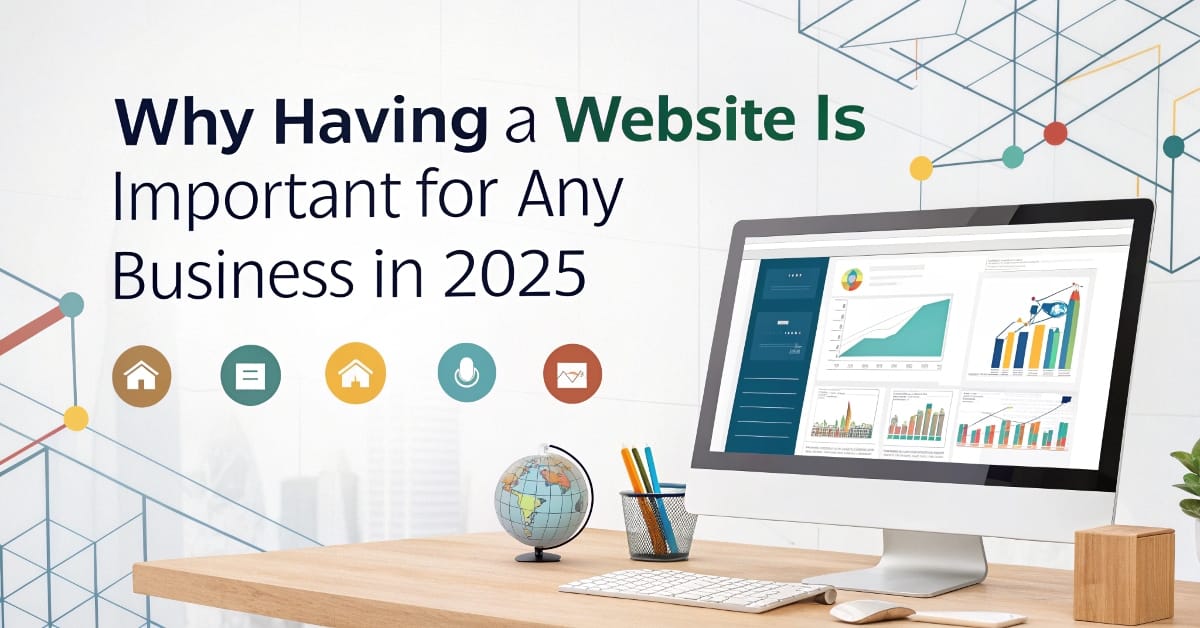Introduction
In today’s fast-paced digital era, having a website is no longer an option but a necessity for businesses of all sizes. As we enter 2025, the significance of an online presence continues to grow, driven by evolving consumer behaviors, technological advancements, and increased competition. A business website serves as the foundation for building credibility, reaching new customers, and driving revenue growth.
Outline
- Why Every Business Needs a Website in 2025
- Changing consumer behavior
- Increased online competition
- 24/7 accessibility and global reach
- Key Benefits of Having a Business Website
- Enhances brand credibility and trust
- Improves customer engagement and interaction
- Provides cost-effective marketing opportunities
- Helps in lead generation and sales growth
- Essential Features for a Successful Business Website
- Mobile-friendly and responsive design
- Fast loading speed and performance
- SEO optimization for better search rankings
- Secure and reliable hosting
- The Role of a Website in Digital Marketing Strategy
- Search engine optimization (SEO)
- Content marketing and blogging
- Social media integration
- Analytics and performance tracking
- How a Website Enhances Customer Experience
- Providing valuable information and resources
- Offering seamless navigation and usability
- Enabling direct communication channels
- Common Myths About Business Websites
- “Only large businesses need a website”
- “Social media is enough”
- “Websites are too expensive”
- Steps to Build an Effective Business Website
- Defining goals and target audience
- Choosing the right platform and hosting provider
- Developing engaging content and visuals
- Regular updates and maintenance
- Why Every Business Needs a Website in 2025
- Changing Consumer Behavior
Consumers rely heavily on the internet for information, shopping, and communication. A website helps businesses adapt to these changing behaviors by providing instant access to their products and services. - Increased Online Competition
The digital marketplace is growing, and businesses without a website risk losing potential customers to competitors who have established online credibility. - 24/7 Accessibility and Global Reach
Unlike physical stores, a website allows businesses to operate round the clock and reach audiences beyond local markets, ensuring wider visibility and sales potential.
- Changing Consumer Behavior
- Key Benefits of Having a Business Website
- Enhances Brand Credibility and Trust
A professionally designed website reassures customers of a business’s legitimacy and reliability, helping to build long-term relationships. - Improves Customer Engagement and Interaction
Features such as chatbots, contact forms, and social media integration allow businesses to interact with customers in real time. - Provides Cost-Effective Marketing Opportunities
Compared to traditional advertising, websites provide an affordable way to reach targeted audiences through digital marketing strategies like SEO and content marketing. - Helps in Lead Generation and Sales Growth
A website serves as a valuable tool for capturing leads and converting them into customers through strategically placed calls-to-action (CTAs).
- Enhances Brand Credibility and Trust
- Essential Features for a Successful Business Website
- Mobile-Friendly and Responsive Design
With mobile traffic surpassing desktop usage, having a responsive website is essential for providing a seamless experience across all devices. - Fast Loading Speed and Performance
Slow websites can deter potential customers; optimizing speed ensures a smooth user experience and higher conversion rates. - SEO Optimization for Better Search Rankings
Implementing on-page and technical SEO practices helps improve visibility on search engines, driving organic traffic. - Secure and Reliable Hosting
A secure website with SSL certificates and reliable hosting ensures data protection and trustworthiness.
- Mobile-Friendly and Responsive Design
- The Role of a Website in Digital Marketing Strategy
- Search Engine Optimization (SEO)
A well-optimized website improves search engine rankings, making it easier for customers to find your business online. - Content Marketing and Blogging
Regular blog posts and valuable content help establish authority and engage potential customers. - Social Media Integration
Linking social media platforms to your website increases visibility and enhances customer engagement. - Analytics and Performance Tracking
Tools like Google Analytics help track visitor behavior, enabling businesses to optimize their strategies.
- Search Engine Optimization (SEO)
- How a Website Enhances Customer Experience
- Providing Valuable Information and Resources
Customers can access product details, pricing, and FAQs conveniently on the website. - Offering Seamless Navigation and Usability
A user-friendly interface enhances customer satisfaction and reduces bounce rates. - Enabling Direct Communication Channels
Contact forms, live chat, and feedback options facilitate direct communication and better customer support.
- Providing Valuable Information and Resources
- Common Myths About Business Websites
- “Only Large Businesses Need a Website”
Small businesses can benefit equally from a website, gaining credibility and expanding their reach. - “Social Media is Enough”
While social media helps in engagement, a website offers complete control over branding and customer experience. - “Websites Are Too Expensive”
With affordable options available, businesses of all sizes can invest in an effective website without breaking the bank.
- “Only Large Businesses Need a Website”
- Steps to Build an Effective Business Website
- Defining Goals and Target Audience
Identifying the target market and business objectives ensures a focused approach to website design and content. - Choosing the Right Platform and Hosting Provider
Platforms like WordPress or Shopify provide flexible solutions based on business needs. - Developing Engaging Content and Visuals
High-quality images, videos, and compelling copy enhance the user experience and brand messaging. - Regular Updates and Maintenance
Keeping the website updated with fresh content and security patches ensures its effectiveness and longevity.
- Defining Goals and Target Audience
Need professional help with designing your business website? Get our expert web design services today and transform your ideas into reality. Check out our blog for more insights on building and optimizing your website!
Conclusion
In 2025, having a website is essential for any business aiming to stay competitive and grow. It provides credibility, enhances customer trust, and opens doors to new opportunities. Investing in a well-optimized website is a smart move that can drive long-term success for businesses of all types.





0 Comments